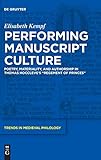Performing Manuscript Culture : Poetry, Materiality, and Authorship in Thomas Hoccleve’s "Regement of Princes" / Elisabeth Kempf.
Material type: TextSeries: Trends in Medieval Philology ; 33Publisher: Berlin ; Boston : De Gruyter, [2016]Copyright date: ©2017Description: 1 online resource (IX, 207 p.)Content type:
TextSeries: Trends in Medieval Philology ; 33Publisher: Berlin ; Boston : De Gruyter, [2016]Copyright date: ©2017Description: 1 online resource (IX, 207 p.)Content type: - 9783110522457
- 9783110522587
- 9783110523089
- Literature and society -- History -- To 1500 -- England -- England
- Literature and society -- England -- History -- To 1500
- Literature, Medieval -- Criticism, Textual
- Manuscripts, Medieval -- History
- Performance in literature
- Political poetry, English (Middle) -- History and criticism
- Hoccleve, Thomas
- Material Philology
- Performativität
- Regement of Princes
- LITERARY CRITICISM / Medieval
- Material Philology
- Performativity
- Regement of Princes
- Thomas Hoccleve
- 821/.2 23
- online - DeGruyter
- Issued also in print.
| Item type | Current library | Call number | URL | Status | Notes | Barcode | |
|---|---|---|---|---|---|---|---|
 eBook
eBook
|
Biblioteca "Angelicum" Pont. Univ. S.Tommaso d'Aquino Nuvola online | online - DeGruyter (Browse shelf(Opens below)) | Online access | Not for loan (Accesso limitato) | Accesso per gli utenti autorizzati / Access for authorized users | (dgr)9783110523089 |
Browsing Biblioteca "Angelicum" Pont. Univ. S.Tommaso d'Aquino shelves, Shelving location: Nuvola online Close shelf browser (Hides shelf browser)
Dissertation FU Berlin 2014.
Frontmatter -- Acknowledgments -- Contents -- Abbreviations -- 1. Introduction: the Regement of Princes as a Manuscript Fiction -- 2 “Hoccleve, fadir myn, men clepen me”: Textual Biography in the Regement of Princes -- 3. “That text I undirstonde thus alwey”: Glosinge in the Regement of Princes -- 4. “Of his persone, I have heere his liknesse Do make”: Mediality and Conceptions of Authorship in the Regement of Princes -- 5. Conclusions -- Works Cited -- Images -- Indices
restricted access online access with authorization star
http://purl.org/coar/access_right/c_16ec
This study conceives of Thomas Hoccleve’s Regement of Princes (1410-1413) as an essentially performative text, one that expresses its awareness of the manuscript culture in which it is so firmly rooted. The openness of manuscripts is a recurring subject in the Regement and is not only expressed through mere descriptions of, but through complex references to this manuscript context. Performances of manuscript culture manifest themselves in several aspects of the text. The first is the narrator persona, and especially the question of how persona and text are intertwined. The second is the constantly recurring interpretation of "es from authoritative sources that pervades the Regement. This urge to interpret is expressed both in the tradition of adding marginal glosses and in the process of subjecting the text to an exegetical reading. The third aspect is the relation between text and images in the Regement’s manuscripts, which shows how mediality is performed and how the manuscript context is made the focus of this performance. In this monograph, all of these aspects are studied in a mindset that combines the concept of performativity with the postulations of Material Philology.
Issued also in print.
Mode of access: Internet via World Wide Web.
In English.
Description based on online resource; title from PDF title page (publisher's Web site, viewed 25. Jun 2024)









